Robert Gordon University Arbitration Law Case Study and Analysis
VerifiedAdded on 2022/08/27
|14
|3847
|27
Report
AI Summary
This report analyzes a case study concerning arbitration law, focusing on the application of the LCIA Rules (2014). The primary issues revolve around challenges to the tribunal's jurisdiction, allegations of bias, and the potential impact of EU sanctions on the arbitration process. The report examines the respondent's challenge to the tribunal's jurisdiction, the appointment of an expert witness, and the validity of legal representation. It assesses whether the tribunal had the authority to hear the case and whether the procedures followed adhered to the LCIA rules. Furthermore, the report evaluates the potential for bias due to the relationship between the legal representative and the expert witness. The report also considers whether the inclusion of the claimant on the EU sanctions list affects the arbitration process. Finally, the report concludes with recommendations for the tribunal, emphasizing the need for impartiality and fairness in its decisions, including the potential for revising the award based on the possibility of bias.
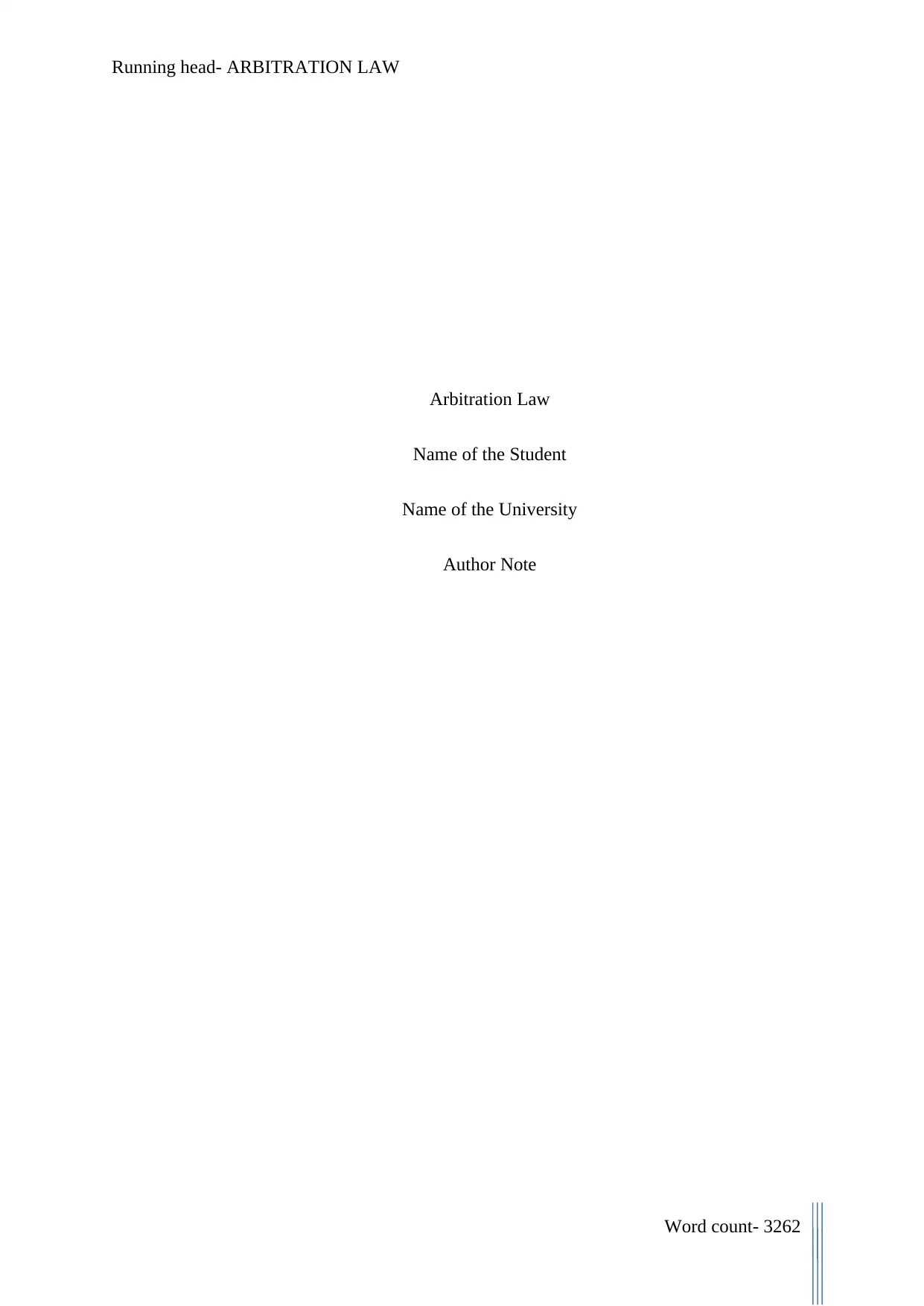
Word count- 3262
Running head- ARBITRATION LAW
Arbitration Law
Name of the Student
Name of the University
Author Note
Running head- ARBITRATION LAW
Arbitration Law
Name of the Student
Name of the University
Author Note
Paraphrase This Document
Need a fresh take? Get an instant paraphrase of this document with our AI Paraphraser
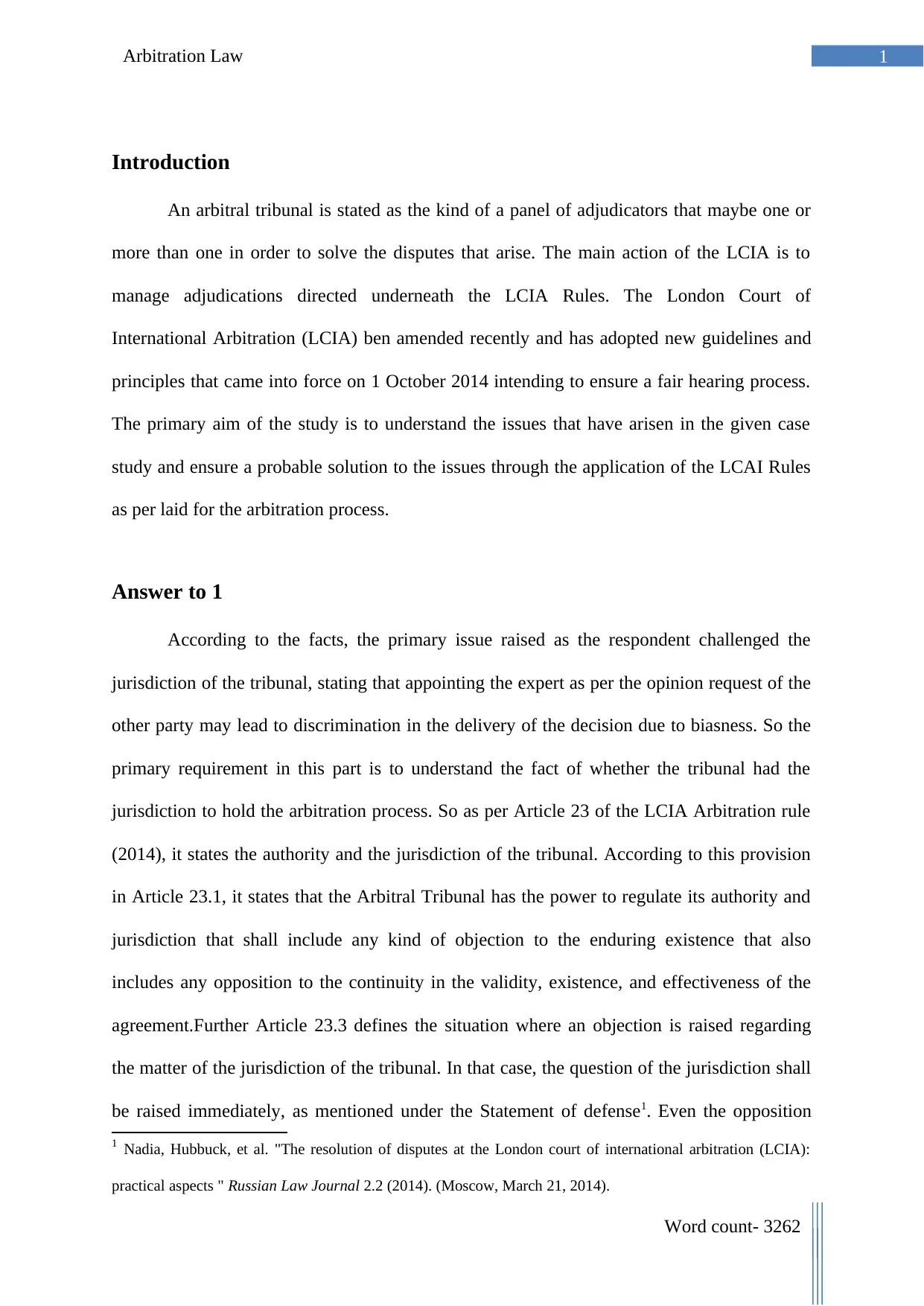
1Arbitration Law
Word count- 3262
Introduction
An arbitral tribunal is stated as the kind of a panel of adjudicators that maybe one or
more than one in order to solve the disputes that arise. The main action of the LCIA is to
manage adjudications directed underneath the LCIA Rules. The London Court of
International Arbitration (LCIA) ben amended recently and has adopted new guidelines and
principles that came into force on 1 October 2014 intending to ensure a fair hearing process.
The primary aim of the study is to understand the issues that have arisen in the given case
study and ensure a probable solution to the issues through the application of the LCAI Rules
as per laid for the arbitration process.
Answer to 1
According to the facts, the primary issue raised as the respondent challenged the
jurisdiction of the tribunal, stating that appointing the expert as per the opinion request of the
other party may lead to discrimination in the delivery of the decision due to biasness. So the
primary requirement in this part is to understand the fact of whether the tribunal had the
jurisdiction to hold the arbitration process. So as per Article 23 of the LCIA Arbitration rule
(2014), it states the authority and the jurisdiction of the tribunal. According to this provision
in Article 23.1, it states that the Arbitral Tribunal has the power to regulate its authority and
jurisdiction that shall include any kind of objection to the enduring existence that also
includes any opposition to the continuity in the validity, existence, and effectiveness of the
agreement.Further Article 23.3 defines the situation where an objection is raised regarding
the matter of the jurisdiction of the tribunal. In that case, the question of the jurisdiction shall
be raised immediately, as mentioned under the Statement of defense1. Even the opposition
1 Nadia, Hubbuck, et al. "The resolution of disputes at the London court of international arbitration (LCIA):
practical aspects " Russian Law Journal 2.2 (2014). (Moscow, March 21, 2014).
Word count- 3262
Introduction
An arbitral tribunal is stated as the kind of a panel of adjudicators that maybe one or
more than one in order to solve the disputes that arise. The main action of the LCIA is to
manage adjudications directed underneath the LCIA Rules. The London Court of
International Arbitration (LCIA) ben amended recently and has adopted new guidelines and
principles that came into force on 1 October 2014 intending to ensure a fair hearing process.
The primary aim of the study is to understand the issues that have arisen in the given case
study and ensure a probable solution to the issues through the application of the LCAI Rules
as per laid for the arbitration process.
Answer to 1
According to the facts, the primary issue raised as the respondent challenged the
jurisdiction of the tribunal, stating that appointing the expert as per the opinion request of the
other party may lead to discrimination in the delivery of the decision due to biasness. So the
primary requirement in this part is to understand the fact of whether the tribunal had the
jurisdiction to hold the arbitration process. So as per Article 23 of the LCIA Arbitration rule
(2014), it states the authority and the jurisdiction of the tribunal. According to this provision
in Article 23.1, it states that the Arbitral Tribunal has the power to regulate its authority and
jurisdiction that shall include any kind of objection to the enduring existence that also
includes any opposition to the continuity in the validity, existence, and effectiveness of the
agreement.Further Article 23.3 defines the situation where an objection is raised regarding
the matter of the jurisdiction of the tribunal. In that case, the question of the jurisdiction shall
be raised immediately, as mentioned under the Statement of defense1. Even the opposition
1 Nadia, Hubbuck, et al. "The resolution of disputes at the London court of international arbitration (LCIA):
practical aspects " Russian Law Journal 2.2 (2014). (Moscow, March 21, 2014).
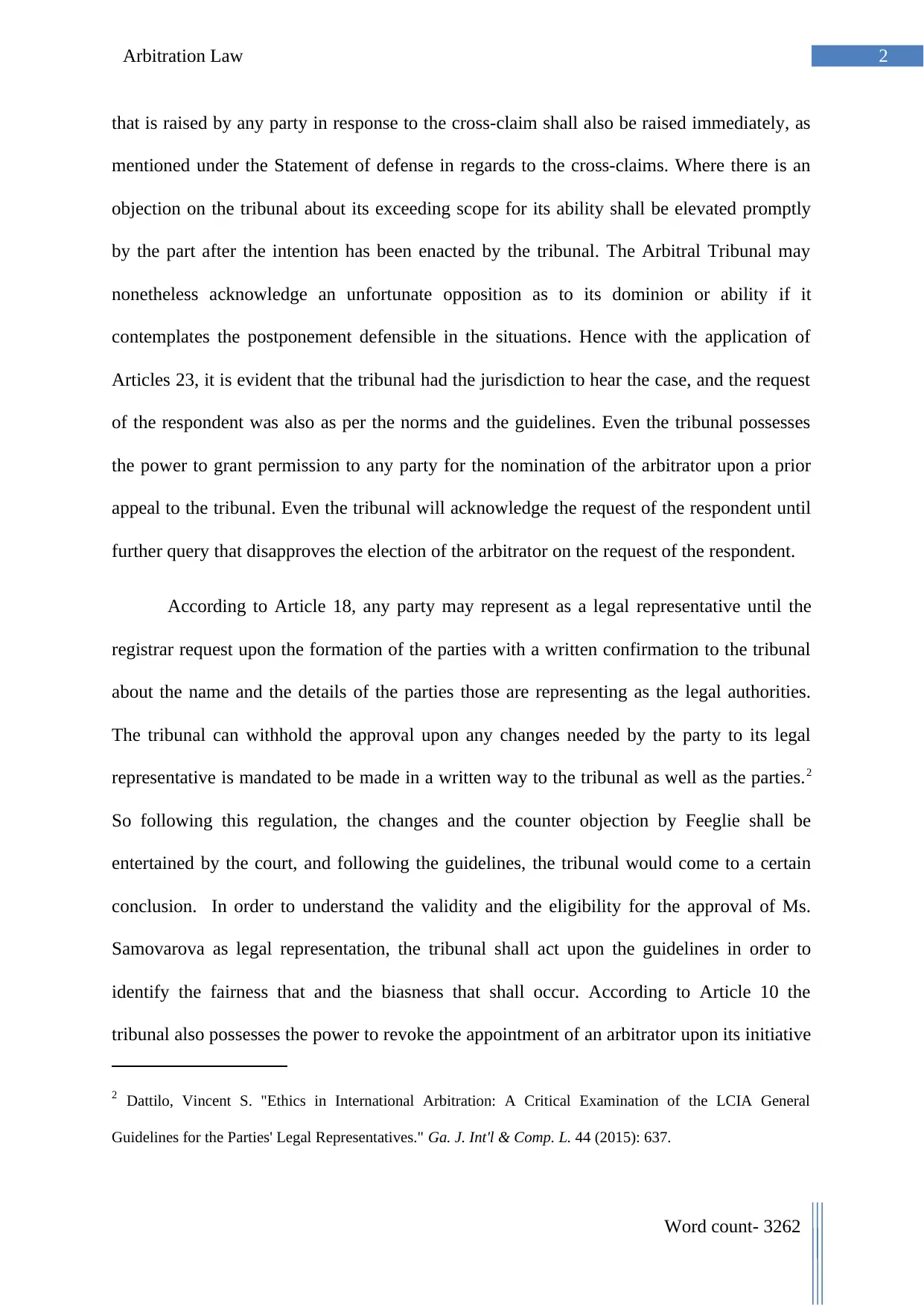
2Arbitration Law
Word count- 3262
that is raised by any party in response to the cross-claim shall also be raised immediately, as
mentioned under the Statement of defense in regards to the cross-claims. Where there is an
objection on the tribunal about its exceeding scope for its ability shall be elevated promptly
by the part after the intention has been enacted by the tribunal. The Arbitral Tribunal may
nonetheless acknowledge an unfortunate opposition as to its dominion or ability if it
contemplates the postponement defensible in the situations. Hence with the application of
Articles 23, it is evident that the tribunal had the jurisdiction to hear the case, and the request
of the respondent was also as per the norms and the guidelines. Even the tribunal possesses
the power to grant permission to any party for the nomination of the arbitrator upon a prior
appeal to the tribunal. Even the tribunal will acknowledge the request of the respondent until
further query that disapproves the election of the arbitrator on the request of the respondent.
According to Article 18, any party may represent as a legal representative until the
registrar request upon the formation of the parties with a written confirmation to the tribunal
about the name and the details of the parties those are representing as the legal authorities.
The tribunal can withhold the approval upon any changes needed by the party to its legal
representative is mandated to be made in a written way to the tribunal as well as the parties.2
So following this regulation, the changes and the counter objection by Feeglie shall be
entertained by the court, and following the guidelines, the tribunal would come to a certain
conclusion. In order to understand the validity and the eligibility for the approval of Ms.
Samovarova as legal representation, the tribunal shall act upon the guidelines in order to
identify the fairness that and the biasness that shall occur. According to Article 10 the
tribunal also possesses the power to revoke the appointment of an arbitrator upon its initiative
2 Dattilo, Vincent S. "Ethics in International Arbitration: A Critical Examination of the LCIA General
Guidelines for the Parties' Legal Representatives." Ga. J. Int'l & Comp. L. 44 (2015): 637.
Word count- 3262
that is raised by any party in response to the cross-claim shall also be raised immediately, as
mentioned under the Statement of defense in regards to the cross-claims. Where there is an
objection on the tribunal about its exceeding scope for its ability shall be elevated promptly
by the part after the intention has been enacted by the tribunal. The Arbitral Tribunal may
nonetheless acknowledge an unfortunate opposition as to its dominion or ability if it
contemplates the postponement defensible in the situations. Hence with the application of
Articles 23, it is evident that the tribunal had the jurisdiction to hear the case, and the request
of the respondent was also as per the norms and the guidelines. Even the tribunal possesses
the power to grant permission to any party for the nomination of the arbitrator upon a prior
appeal to the tribunal. Even the tribunal will acknowledge the request of the respondent until
further query that disapproves the election of the arbitrator on the request of the respondent.
According to Article 18, any party may represent as a legal representative until the
registrar request upon the formation of the parties with a written confirmation to the tribunal
about the name and the details of the parties those are representing as the legal authorities.
The tribunal can withhold the approval upon any changes needed by the party to its legal
representative is mandated to be made in a written way to the tribunal as well as the parties.2
So following this regulation, the changes and the counter objection by Feeglie shall be
entertained by the court, and following the guidelines, the tribunal would come to a certain
conclusion. In order to understand the validity and the eligibility for the approval of Ms.
Samovarova as legal representation, the tribunal shall act upon the guidelines in order to
identify the fairness that and the biasness that shall occur. According to Article 10 the
tribunal also possesses the power to revoke the appointment of an arbitrator upon its initiative
2 Dattilo, Vincent S. "Ethics in International Arbitration: A Critical Examination of the LCIA General
Guidelines for the Parties' Legal Representatives." Ga. J. Int'l & Comp. L. 44 (2015): 637.
⊘ This is a preview!⊘
Do you want full access?
Subscribe today to unlock all pages.

Trusted by 1+ million students worldwide
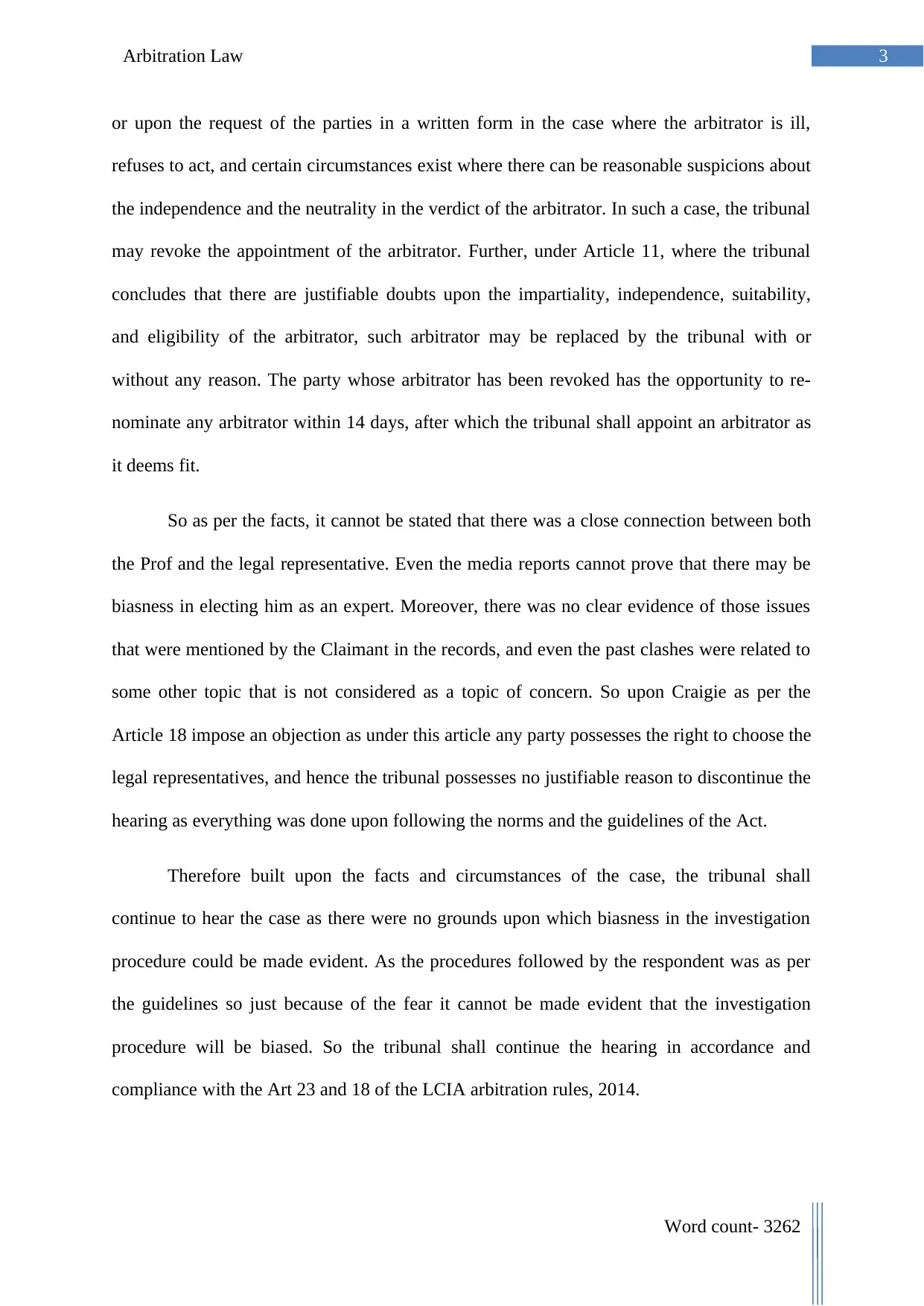
3Arbitration Law
Word count- 3262
or upon the request of the parties in a written form in the case where the arbitrator is ill,
refuses to act, and certain circumstances exist where there can be reasonable suspicions about
the independence and the neutrality in the verdict of the arbitrator. In such a case, the tribunal
may revoke the appointment of the arbitrator. Further, under Article 11, where the tribunal
concludes that there are justifiable doubts upon the impartiality, independence, suitability,
and eligibility of the arbitrator, such arbitrator may be replaced by the tribunal with or
without any reason. The party whose arbitrator has been revoked has the opportunity to re-
nominate any arbitrator within 14 days, after which the tribunal shall appoint an arbitrator as
it deems fit.
So as per the facts, it cannot be stated that there was a close connection between both
the Prof and the legal representative. Even the media reports cannot prove that there may be
biasness in electing him as an expert. Moreover, there was no clear evidence of those issues
that were mentioned by the Claimant in the records, and even the past clashes were related to
some other topic that is not considered as a topic of concern. So upon Craigie as per the
Article 18 impose an objection as under this article any party possesses the right to choose the
legal representatives, and hence the tribunal possesses no justifiable reason to discontinue the
hearing as everything was done upon following the norms and the guidelines of the Act.
Therefore built upon the facts and circumstances of the case, the tribunal shall
continue to hear the case as there were no grounds upon which biasness in the investigation
procedure could be made evident. As the procedures followed by the respondent was as per
the guidelines so just because of the fear it cannot be made evident that the investigation
procedure will be biased. So the tribunal shall continue the hearing in accordance and
compliance with the Art 23 and 18 of the LCIA arbitration rules, 2014.
Word count- 3262
or upon the request of the parties in a written form in the case where the arbitrator is ill,
refuses to act, and certain circumstances exist where there can be reasonable suspicions about
the independence and the neutrality in the verdict of the arbitrator. In such a case, the tribunal
may revoke the appointment of the arbitrator. Further, under Article 11, where the tribunal
concludes that there are justifiable doubts upon the impartiality, independence, suitability,
and eligibility of the arbitrator, such arbitrator may be replaced by the tribunal with or
without any reason. The party whose arbitrator has been revoked has the opportunity to re-
nominate any arbitrator within 14 days, after which the tribunal shall appoint an arbitrator as
it deems fit.
So as per the facts, it cannot be stated that there was a close connection between both
the Prof and the legal representative. Even the media reports cannot prove that there may be
biasness in electing him as an expert. Moreover, there was no clear evidence of those issues
that were mentioned by the Claimant in the records, and even the past clashes were related to
some other topic that is not considered as a topic of concern. So upon Craigie as per the
Article 18 impose an objection as under this article any party possesses the right to choose the
legal representatives, and hence the tribunal possesses no justifiable reason to discontinue the
hearing as everything was done upon following the norms and the guidelines of the Act.
Therefore built upon the facts and circumstances of the case, the tribunal shall
continue to hear the case as there were no grounds upon which biasness in the investigation
procedure could be made evident. As the procedures followed by the respondent was as per
the guidelines so just because of the fear it cannot be made evident that the investigation
procedure will be biased. So the tribunal shall continue the hearing in accordance and
compliance with the Art 23 and 18 of the LCIA arbitration rules, 2014.
Paraphrase This Document
Need a fresh take? Get an instant paraphrase of this document with our AI Paraphraser
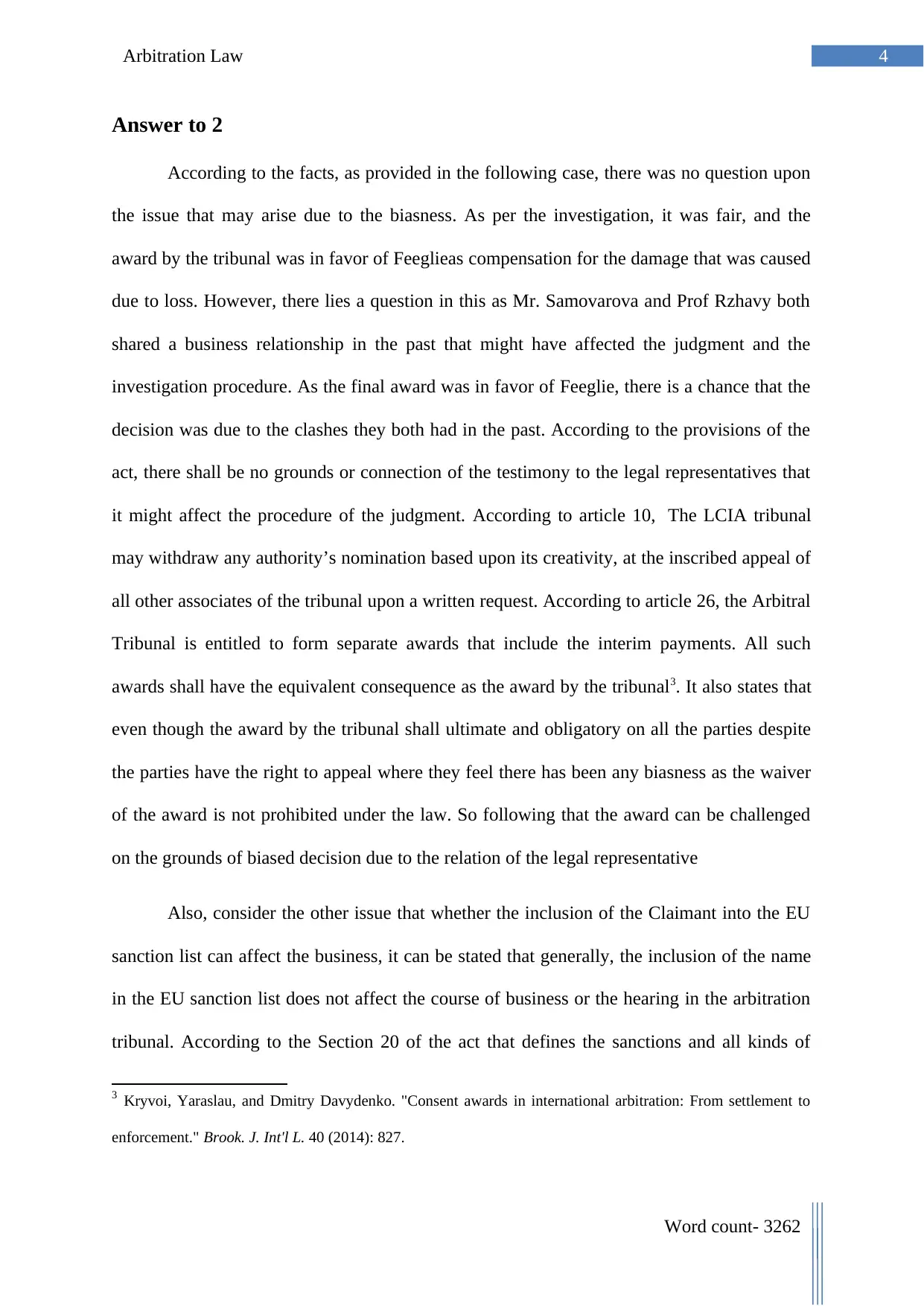
4Arbitration Law
Word count- 3262
Answer to 2
According to the facts, as provided in the following case, there was no question upon
the issue that may arise due to the biasness. As per the investigation, it was fair, and the
award by the tribunal was in favor of Feeglieas compensation for the damage that was caused
due to loss. However, there lies a question in this as Mr. Samovarova and Prof Rzhavy both
shared a business relationship in the past that might have affected the judgment and the
investigation procedure. As the final award was in favor of Feeglie, there is a chance that the
decision was due to the clashes they both had in the past. According to the provisions of the
act, there shall be no grounds or connection of the testimony to the legal representatives that
it might affect the procedure of the judgment. According to article 10, The LCIA tribunal
may withdraw any authority’s nomination based upon its creativity, at the inscribed appeal of
all other associates of the tribunal upon a written request. According to article 26, the Arbitral
Tribunal is entitled to form separate awards that include the interim payments. All such
awards shall have the equivalent consequence as the award by the tribunal3. It also states that
even though the award by the tribunal shall ultimate and obligatory on all the parties despite
the parties have the right to appeal where they feel there has been any biasness as the waiver
of the award is not prohibited under the law. So following that the award can be challenged
on the grounds of biased decision due to the relation of the legal representative
Also, consider the other issue that whether the inclusion of the Claimant into the EU
sanction list can affect the business, it can be stated that generally, the inclusion of the name
in the EU sanction list does not affect the course of business or the hearing in the arbitration
tribunal. According to the Section 20 of the act that defines the sanctions and all kinds of
3 Kryvoi, Yaraslau, and Dmitry Davydenko. "Consent awards in international arbitration: From settlement to
enforcement." Brook. J. Int'l L. 40 (2014): 827.
Word count- 3262
Answer to 2
According to the facts, as provided in the following case, there was no question upon
the issue that may arise due to the biasness. As per the investigation, it was fair, and the
award by the tribunal was in favor of Feeglieas compensation for the damage that was caused
due to loss. However, there lies a question in this as Mr. Samovarova and Prof Rzhavy both
shared a business relationship in the past that might have affected the judgment and the
investigation procedure. As the final award was in favor of Feeglie, there is a chance that the
decision was due to the clashes they both had in the past. According to the provisions of the
act, there shall be no grounds or connection of the testimony to the legal representatives that
it might affect the procedure of the judgment. According to article 10, The LCIA tribunal
may withdraw any authority’s nomination based upon its creativity, at the inscribed appeal of
all other associates of the tribunal upon a written request. According to article 26, the Arbitral
Tribunal is entitled to form separate awards that include the interim payments. All such
awards shall have the equivalent consequence as the award by the tribunal3. It also states that
even though the award by the tribunal shall ultimate and obligatory on all the parties despite
the parties have the right to appeal where they feel there has been any biasness as the waiver
of the award is not prohibited under the law. So following that the award can be challenged
on the grounds of biased decision due to the relation of the legal representative
Also, consider the other issue that whether the inclusion of the Claimant into the EU
sanction list can affect the business, it can be stated that generally, the inclusion of the name
in the EU sanction list does not affect the course of business or the hearing in the arbitration
tribunal. According to the Section 20 of the act that defines the sanctions and all kinds of
3 Kryvoi, Yaraslau, and Dmitry Davydenko. "Consent awards in international arbitration: From settlement to
enforcement." Brook. J. Int'l L. 40 (2014): 827.
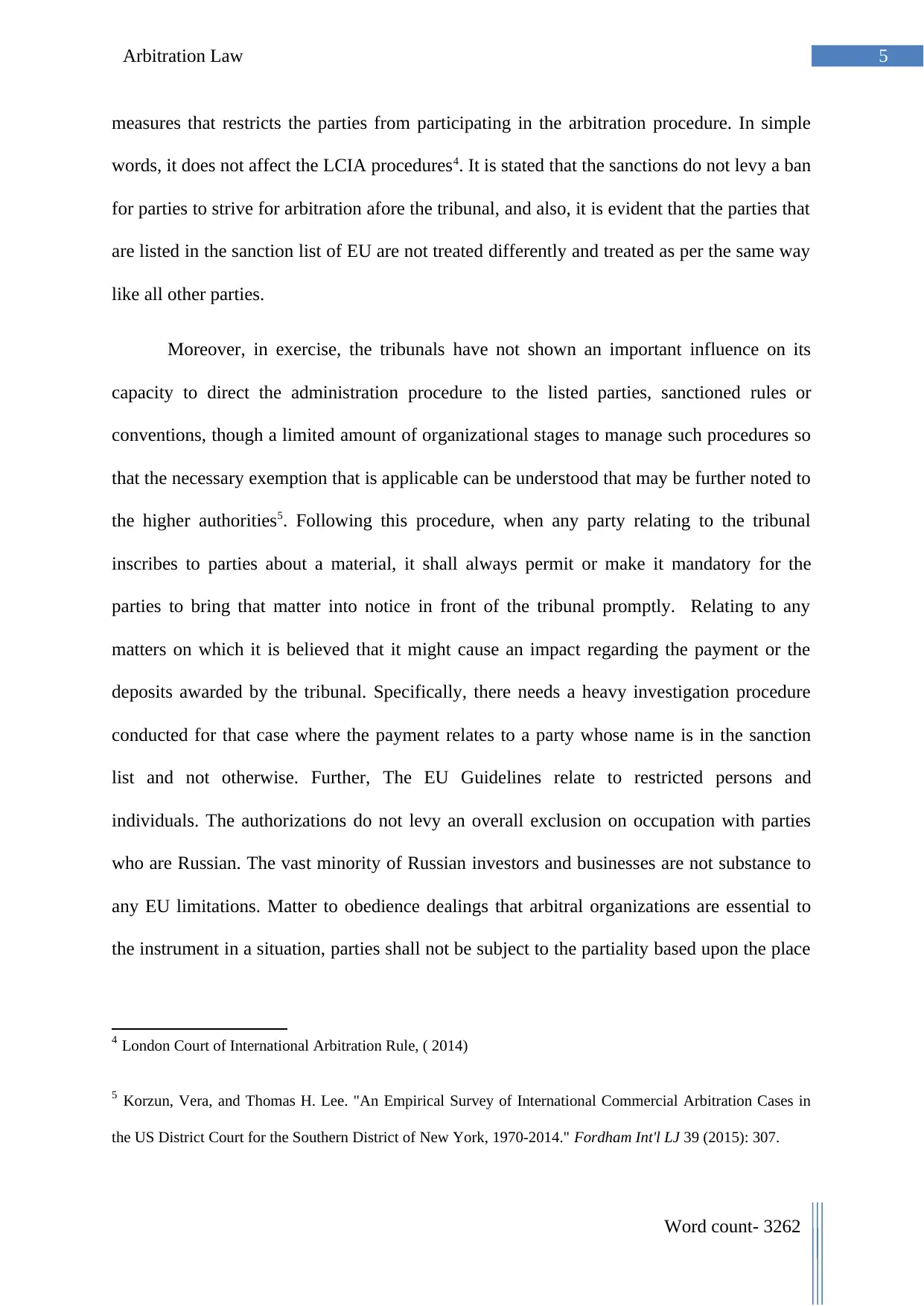
5Arbitration Law
Word count- 3262
measures that restricts the parties from participating in the arbitration procedure. In simple
words, it does not affect the LCIA procedures4. It is stated that the sanctions do not levy a ban
for parties to strive for arbitration afore the tribunal, and also, it is evident that the parties that
are listed in the sanction list of EU are not treated differently and treated as per the same way
like all other parties.
Moreover, in exercise, the tribunals have not shown an important influence on its
capacity to direct the administration procedure to the listed parties, sanctioned rules or
conventions, though a limited amount of organizational stages to manage such procedures so
that the necessary exemption that is applicable can be understood that may be further noted to
the higher authorities5. Following this procedure, when any party relating to the tribunal
inscribes to parties about a material, it shall always permit or make it mandatory for the
parties to bring that matter into notice in front of the tribunal promptly. Relating to any
matters on which it is believed that it might cause an impact regarding the payment or the
deposits awarded by the tribunal. Specifically, there needs a heavy investigation procedure
conducted for that case where the payment relates to a party whose name is in the sanction
list and not otherwise. Further, The EU Guidelines relate to restricted persons and
individuals. The authorizations do not levy an overall exclusion on occupation with parties
who are Russian. The vast minority of Russian investors and businesses are not substance to
any EU limitations. Matter to obedience dealings that arbitral organizations are essential to
the instrument in a situation, parties shall not be subject to the partiality based upon the place
4 London Court of International Arbitration Rule, ( 2014)
5 Korzun, Vera, and Thomas H. Lee. "An Empirical Survey of International Commercial Arbitration Cases in
the US District Court for the Southern District of New York, 1970-2014." Fordham Int'l LJ 39 (2015): 307.
Word count- 3262
measures that restricts the parties from participating in the arbitration procedure. In simple
words, it does not affect the LCIA procedures4. It is stated that the sanctions do not levy a ban
for parties to strive for arbitration afore the tribunal, and also, it is evident that the parties that
are listed in the sanction list of EU are not treated differently and treated as per the same way
like all other parties.
Moreover, in exercise, the tribunals have not shown an important influence on its
capacity to direct the administration procedure to the listed parties, sanctioned rules or
conventions, though a limited amount of organizational stages to manage such procedures so
that the necessary exemption that is applicable can be understood that may be further noted to
the higher authorities5. Following this procedure, when any party relating to the tribunal
inscribes to parties about a material, it shall always permit or make it mandatory for the
parties to bring that matter into notice in front of the tribunal promptly. Relating to any
matters on which it is believed that it might cause an impact regarding the payment or the
deposits awarded by the tribunal. Specifically, there needs a heavy investigation procedure
conducted for that case where the payment relates to a party whose name is in the sanction
list and not otherwise. Further, The EU Guidelines relate to restricted persons and
individuals. The authorizations do not levy an overall exclusion on occupation with parties
who are Russian. The vast minority of Russian investors and businesses are not substance to
any EU limitations. Matter to obedience dealings that arbitral organizations are essential to
the instrument in a situation, parties shall not be subject to the partiality based upon the place
4 London Court of International Arbitration Rule, ( 2014)
5 Korzun, Vera, and Thomas H. Lee. "An Empirical Survey of International Commercial Arbitration Cases in
the US District Court for the Southern District of New York, 1970-2014." Fordham Int'l LJ 39 (2015): 307.
⊘ This is a preview!⊘
Do you want full access?
Subscribe today to unlock all pages.

Trusted by 1+ million students worldwide
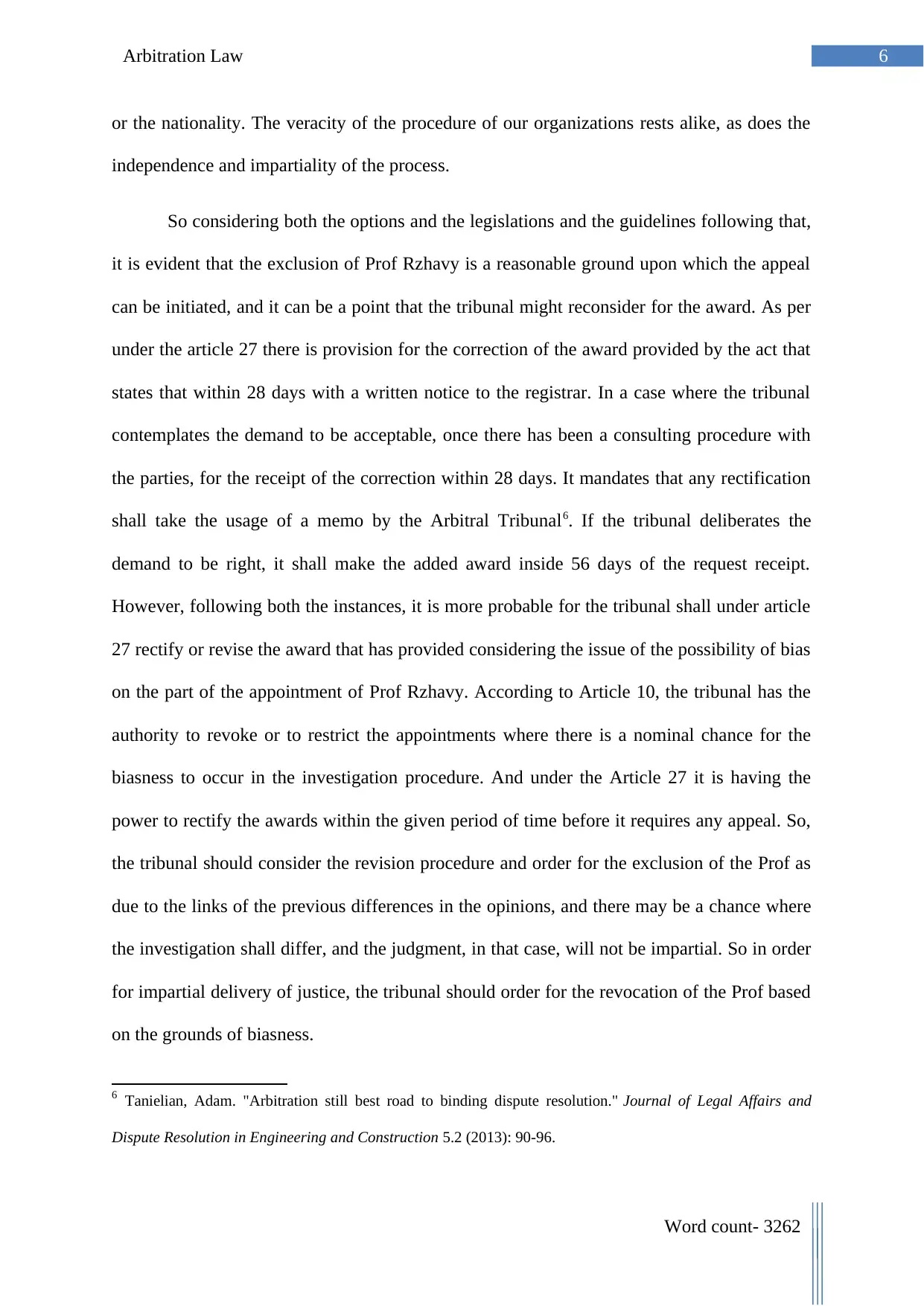
6Arbitration Law
Word count- 3262
or the nationality. The veracity of the procedure of our organizations rests alike, as does the
independence and impartiality of the process.
So considering both the options and the legislations and the guidelines following that,
it is evident that the exclusion of Prof Rzhavy is a reasonable ground upon which the appeal
can be initiated, and it can be a point that the tribunal might reconsider for the award. As per
under the article 27 there is provision for the correction of the award provided by the act that
states that within 28 days with a written notice to the registrar. In a case where the tribunal
contemplates the demand to be acceptable, once there has been a consulting procedure with
the parties, for the receipt of the correction within 28 days. It mandates that any rectification
shall take the usage of a memo by the Arbitral Tribunal6. If the tribunal deliberates the
demand to be right, it shall make the added award inside 56 days of the request receipt.
However, following both the instances, it is more probable for the tribunal shall under article
27 rectify or revise the award that has provided considering the issue of the possibility of bias
on the part of the appointment of Prof Rzhavy. According to Article 10, the tribunal has the
authority to revoke or to restrict the appointments where there is a nominal chance for the
biasness to occur in the investigation procedure. And under the Article 27 it is having the
power to rectify the awards within the given period of time before it requires any appeal. So,
the tribunal should consider the revision procedure and order for the exclusion of the Prof as
due to the links of the previous differences in the opinions, and there may be a chance where
the investigation shall differ, and the judgment, in that case, will not be impartial. So in order
for impartial delivery of justice, the tribunal should order for the revocation of the Prof based
on the grounds of biasness.
6 Tanielian, Adam. "Arbitration still best road to binding dispute resolution." Journal of Legal Affairs and
Dispute Resolution in Engineering and Construction 5.2 (2013): 90-96.
Word count- 3262
or the nationality. The veracity of the procedure of our organizations rests alike, as does the
independence and impartiality of the process.
So considering both the options and the legislations and the guidelines following that,
it is evident that the exclusion of Prof Rzhavy is a reasonable ground upon which the appeal
can be initiated, and it can be a point that the tribunal might reconsider for the award. As per
under the article 27 there is provision for the correction of the award provided by the act that
states that within 28 days with a written notice to the registrar. In a case where the tribunal
contemplates the demand to be acceptable, once there has been a consulting procedure with
the parties, for the receipt of the correction within 28 days. It mandates that any rectification
shall take the usage of a memo by the Arbitral Tribunal6. If the tribunal deliberates the
demand to be right, it shall make the added award inside 56 days of the request receipt.
However, following both the instances, it is more probable for the tribunal shall under article
27 rectify or revise the award that has provided considering the issue of the possibility of bias
on the part of the appointment of Prof Rzhavy. According to Article 10, the tribunal has the
authority to revoke or to restrict the appointments where there is a nominal chance for the
biasness to occur in the investigation procedure. And under the Article 27 it is having the
power to rectify the awards within the given period of time before it requires any appeal. So,
the tribunal should consider the revision procedure and order for the exclusion of the Prof as
due to the links of the previous differences in the opinions, and there may be a chance where
the investigation shall differ, and the judgment, in that case, will not be impartial. So in order
for impartial delivery of justice, the tribunal should order for the revocation of the Prof based
on the grounds of biasness.
6 Tanielian, Adam. "Arbitration still best road to binding dispute resolution." Journal of Legal Affairs and
Dispute Resolution in Engineering and Construction 5.2 (2013): 90-96.
Paraphrase This Document
Need a fresh take? Get an instant paraphrase of this document with our AI Paraphraser
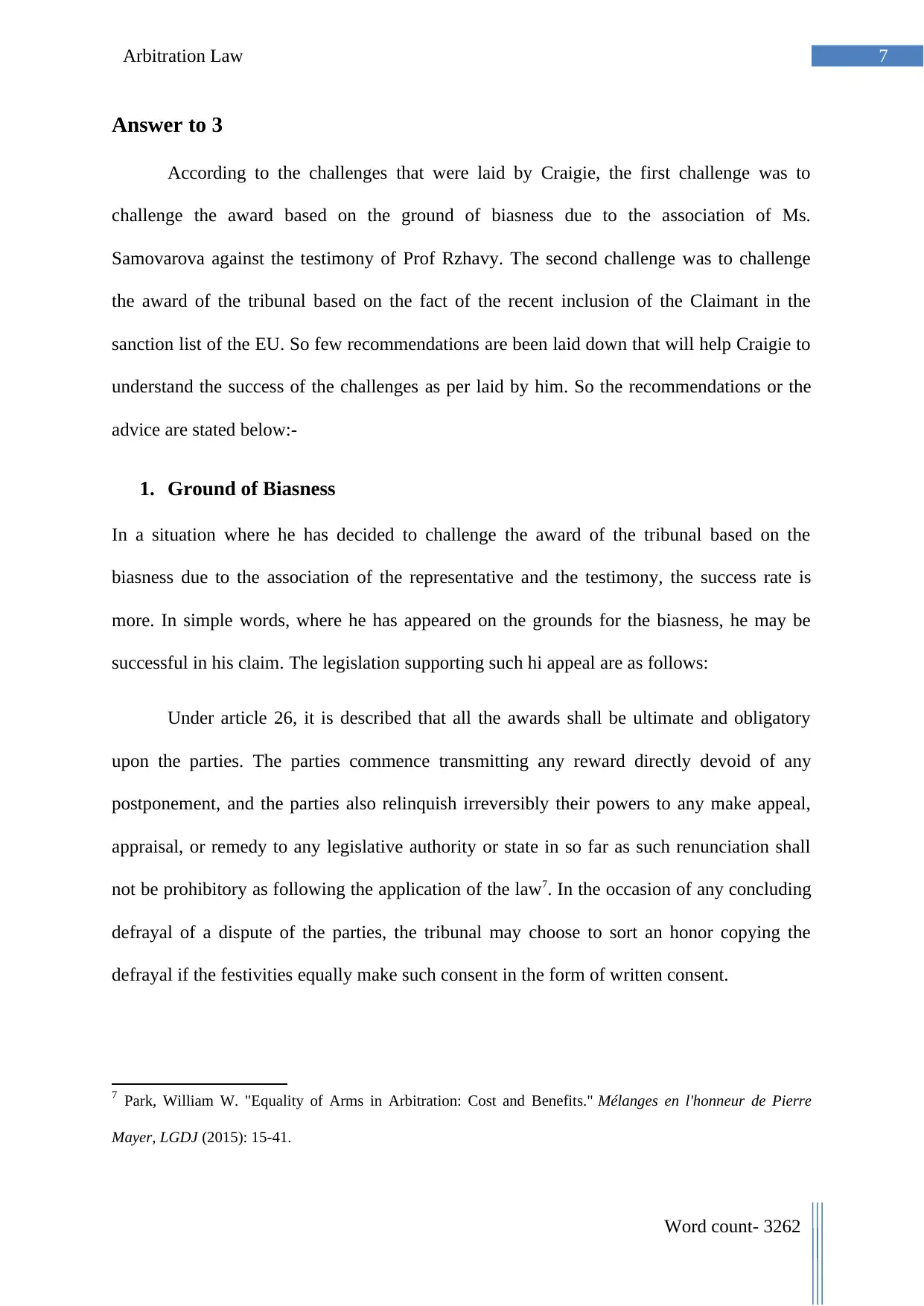
7Arbitration Law
Word count- 3262
Answer to 3
According to the challenges that were laid by Craigie, the first challenge was to
challenge the award based on the ground of biasness due to the association of Ms.
Samovarova against the testimony of Prof Rzhavy. The second challenge was to challenge
the award of the tribunal based on the fact of the recent inclusion of the Claimant in the
sanction list of the EU. So few recommendations are been laid down that will help Craigie to
understand the success of the challenges as per laid by him. So the recommendations or the
advice are stated below:-
1. Ground of Biasness
In a situation where he has decided to challenge the award of the tribunal based on the
biasness due to the association of the representative and the testimony, the success rate is
more. In simple words, where he has appeared on the grounds for the biasness, he may be
successful in his claim. The legislation supporting such hi appeal are as follows:
Under article 26, it is described that all the awards shall be ultimate and obligatory
upon the parties. The parties commence transmitting any reward directly devoid of any
postponement, and the parties also relinquish irreversibly their powers to any make appeal,
appraisal, or remedy to any legislative authority or state in so far as such renunciation shall
not be prohibitory as following the application of the law7. In the occasion of any concluding
defrayal of a dispute of the parties, the tribunal may choose to sort an honor copying the
defrayal if the festivities equally make such consent in the form of written consent.
7 Park, William W. "Equality of Arms in Arbitration: Cost and Benefits." Mélanges en l'honneur de Pierre
Mayer, LGDJ (2015): 15-41.
Word count- 3262
Answer to 3
According to the challenges that were laid by Craigie, the first challenge was to
challenge the award based on the ground of biasness due to the association of Ms.
Samovarova against the testimony of Prof Rzhavy. The second challenge was to challenge
the award of the tribunal based on the fact of the recent inclusion of the Claimant in the
sanction list of the EU. So few recommendations are been laid down that will help Craigie to
understand the success of the challenges as per laid by him. So the recommendations or the
advice are stated below:-
1. Ground of Biasness
In a situation where he has decided to challenge the award of the tribunal based on the
biasness due to the association of the representative and the testimony, the success rate is
more. In simple words, where he has appeared on the grounds for the biasness, he may be
successful in his claim. The legislation supporting such hi appeal are as follows:
Under article 26, it is described that all the awards shall be ultimate and obligatory
upon the parties. The parties commence transmitting any reward directly devoid of any
postponement, and the parties also relinquish irreversibly their powers to any make appeal,
appraisal, or remedy to any legislative authority or state in so far as such renunciation shall
not be prohibitory as following the application of the law7. In the occasion of any concluding
defrayal of a dispute of the parties, the tribunal may choose to sort an honor copying the
defrayal if the festivities equally make such consent in the form of written consent.
7 Park, William W. "Equality of Arms in Arbitration: Cost and Benefits." Mélanges en l'honneur de Pierre
Mayer, LGDJ (2015): 15-41.
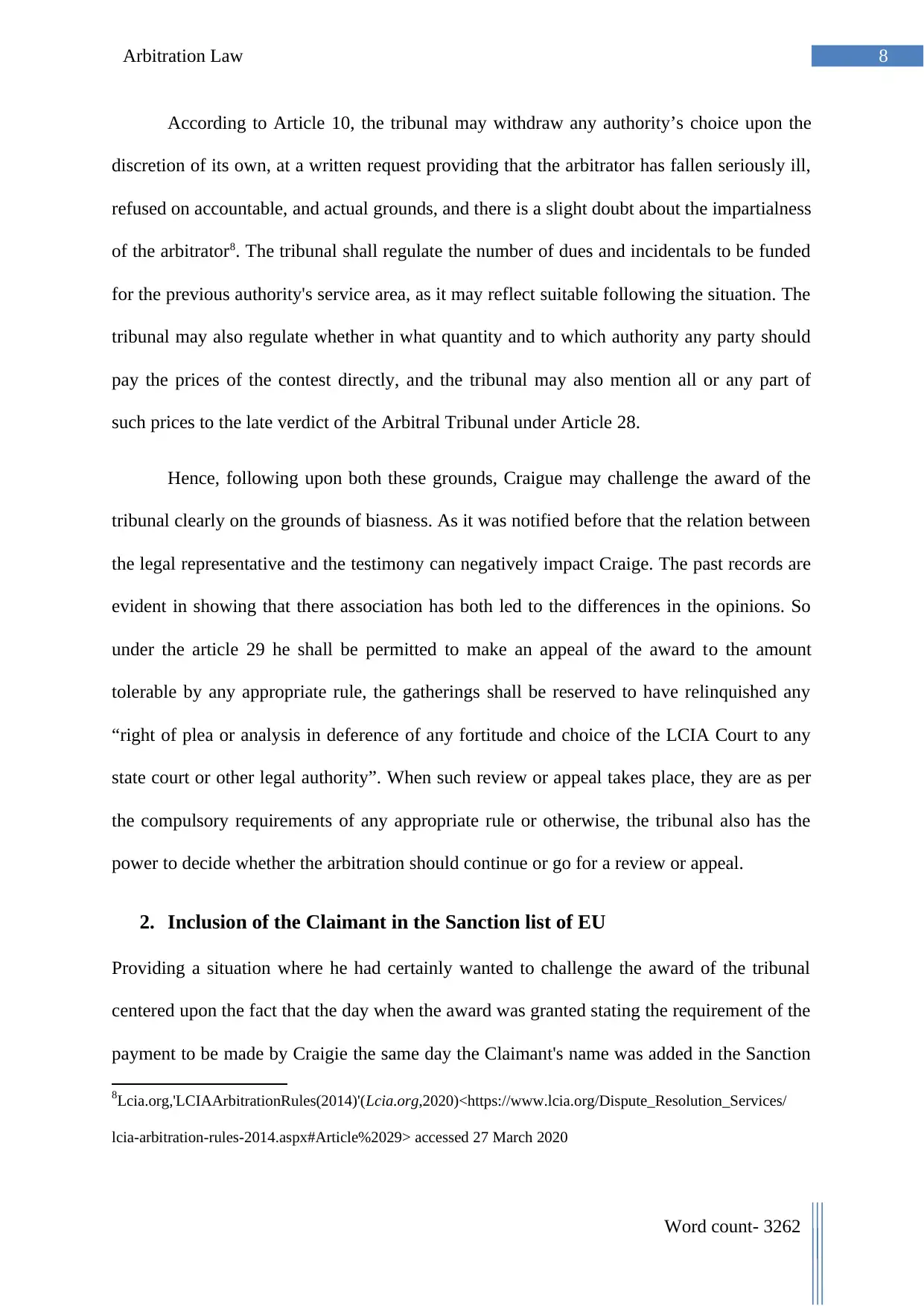
8Arbitration Law
Word count- 3262
According to Article 10, the tribunal may withdraw any authority’s choice upon the
discretion of its own, at a written request providing that the arbitrator has fallen seriously ill,
refused on accountable, and actual grounds, and there is a slight doubt about the impartialness
of the arbitrator8. The tribunal shall regulate the number of dues and incidentals to be funded
for the previous authority's service area, as it may reflect suitable following the situation. The
tribunal may also regulate whether in what quantity and to which authority any party should
pay the prices of the contest directly, and the tribunal may also mention all or any part of
such prices to the late verdict of the Arbitral Tribunal under Article 28.
Hence, following upon both these grounds, Craigue may challenge the award of the
tribunal clearly on the grounds of biasness. As it was notified before that the relation between
the legal representative and the testimony can negatively impact Craige. The past records are
evident in showing that there association has both led to the differences in the opinions. So
under the article 29 he shall be permitted to make an appeal of the award to the amount
tolerable by any appropriate rule, the gatherings shall be reserved to have relinquished any
“right of plea or analysis in deference of any fortitude and choice of the LCIA Court to any
state court or other legal authority”. When such review or appeal takes place, they are as per
the compulsory requirements of any appropriate rule or otherwise, the tribunal also has the
power to decide whether the arbitration should continue or go for a review or appeal.
2. Inclusion of the Claimant in the Sanction list of EU
Providing a situation where he had certainly wanted to challenge the award of the tribunal
centered upon the fact that the day when the award was granted stating the requirement of the
payment to be made by Craigie the same day the Claimant's name was added in the Sanction
8Lcia.org,'LCIAArbitrationRules(2014)'(Lcia.org,2020)<https://www.lcia.org/Dispute_Resolution_Services/
lcia-arbitration-rules-2014.aspx#Article%2029> accessed 27 March 2020
Word count- 3262
According to Article 10, the tribunal may withdraw any authority’s choice upon the
discretion of its own, at a written request providing that the arbitrator has fallen seriously ill,
refused on accountable, and actual grounds, and there is a slight doubt about the impartialness
of the arbitrator8. The tribunal shall regulate the number of dues and incidentals to be funded
for the previous authority's service area, as it may reflect suitable following the situation. The
tribunal may also regulate whether in what quantity and to which authority any party should
pay the prices of the contest directly, and the tribunal may also mention all or any part of
such prices to the late verdict of the Arbitral Tribunal under Article 28.
Hence, following upon both these grounds, Craigue may challenge the award of the
tribunal clearly on the grounds of biasness. As it was notified before that the relation between
the legal representative and the testimony can negatively impact Craige. The past records are
evident in showing that there association has both led to the differences in the opinions. So
under the article 29 he shall be permitted to make an appeal of the award to the amount
tolerable by any appropriate rule, the gatherings shall be reserved to have relinquished any
“right of plea or analysis in deference of any fortitude and choice of the LCIA Court to any
state court or other legal authority”. When such review or appeal takes place, they are as per
the compulsory requirements of any appropriate rule or otherwise, the tribunal also has the
power to decide whether the arbitration should continue or go for a review or appeal.
2. Inclusion of the Claimant in the Sanction list of EU
Providing a situation where he had certainly wanted to challenge the award of the tribunal
centered upon the fact that the day when the award was granted stating the requirement of the
payment to be made by Craigie the same day the Claimant's name was added in the Sanction
8Lcia.org,'LCIAArbitrationRules(2014)'(Lcia.org,2020)<https://www.lcia.org/Dispute_Resolution_Services/
lcia-arbitration-rules-2014.aspx#Article%2029> accessed 27 March 2020
⊘ This is a preview!⊘
Do you want full access?
Subscribe today to unlock all pages.

Trusted by 1+ million students worldwide
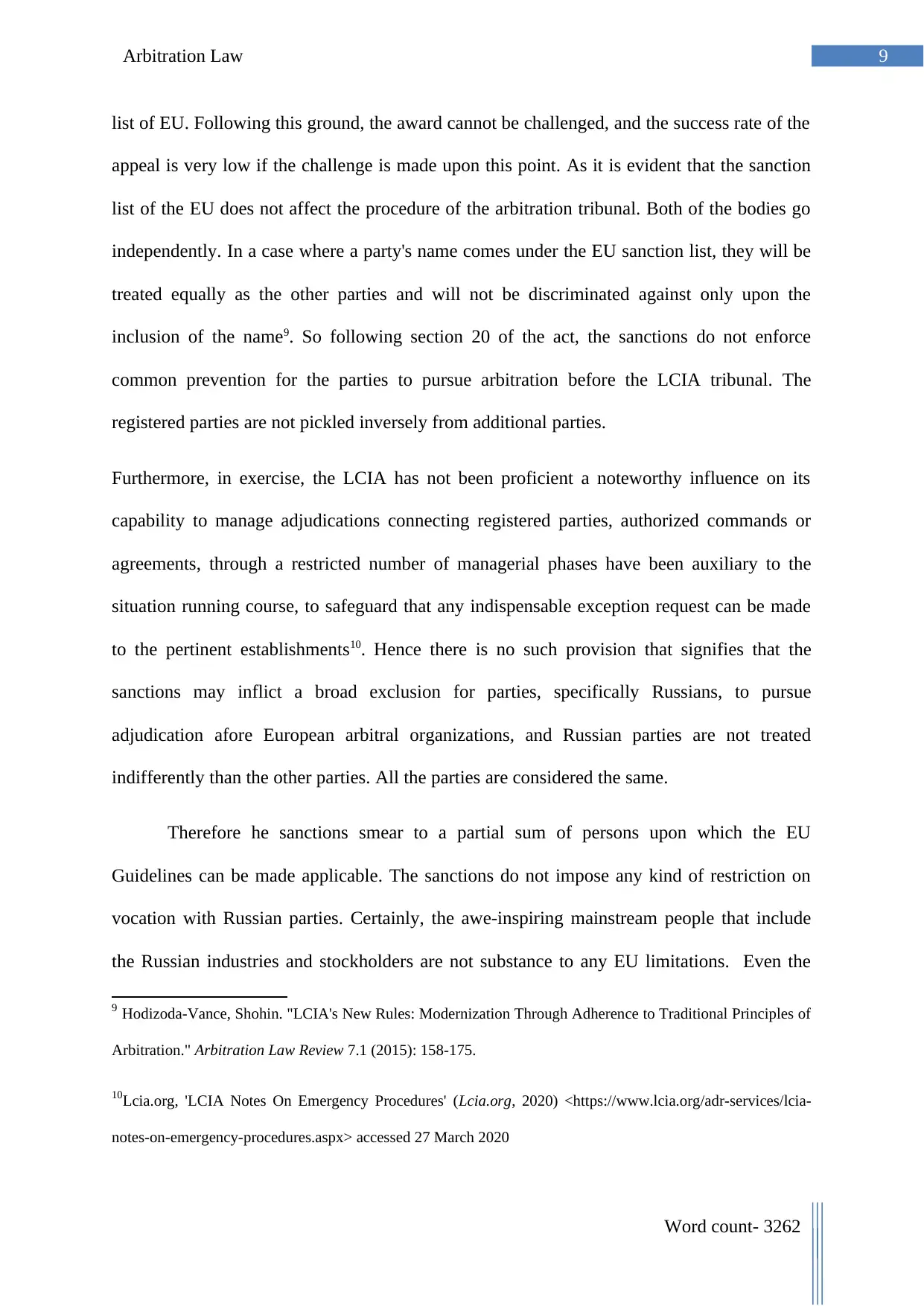
9Arbitration Law
Word count- 3262
list of EU. Following this ground, the award cannot be challenged, and the success rate of the
appeal is very low if the challenge is made upon this point. As it is evident that the sanction
list of the EU does not affect the procedure of the arbitration tribunal. Both of the bodies go
independently. In a case where a party's name comes under the EU sanction list, they will be
treated equally as the other parties and will not be discriminated against only upon the
inclusion of the name9. So following section 20 of the act, the sanctions do not enforce
common prevention for the parties to pursue arbitration before the LCIA tribunal. The
registered parties are not pickled inversely from additional parties.
Furthermore, in exercise, the LCIA has not been proficient a noteworthy influence on its
capability to manage adjudications connecting registered parties, authorized commands or
agreements, through a restricted number of managerial phases have been auxiliary to the
situation running course, to safeguard that any indispensable exception request can be made
to the pertinent establishments10. Hence there is no such provision that signifies that the
sanctions may inflict a broad exclusion for parties, specifically Russians, to pursue
adjudication afore European arbitral organizations, and Russian parties are not treated
indifferently than the other parties. All the parties are considered the same.
Therefore he sanctions smear to a partial sum of persons upon which the EU
Guidelines can be made applicable. The sanctions do not impose any kind of restriction on
vocation with Russian parties. Certainly, the awe-inspiring mainstream people that include
the Russian industries and stockholders are not substance to any EU limitations. Even the
9 Hodizoda-Vance, Shohin. "LCIA's New Rules: Modernization Through Adherence to Traditional Principles of
Arbitration." Arbitration Law Review 7.1 (2015): 158-175.
10Lcia.org, 'LCIA Notes On Emergency Procedures' (Lcia.org, 2020) <https://www.lcia.org/adr-services/lcia-
notes-on-emergency-procedures.aspx> accessed 27 March 2020
Word count- 3262
list of EU. Following this ground, the award cannot be challenged, and the success rate of the
appeal is very low if the challenge is made upon this point. As it is evident that the sanction
list of the EU does not affect the procedure of the arbitration tribunal. Both of the bodies go
independently. In a case where a party's name comes under the EU sanction list, they will be
treated equally as the other parties and will not be discriminated against only upon the
inclusion of the name9. So following section 20 of the act, the sanctions do not enforce
common prevention for the parties to pursue arbitration before the LCIA tribunal. The
registered parties are not pickled inversely from additional parties.
Furthermore, in exercise, the LCIA has not been proficient a noteworthy influence on its
capability to manage adjudications connecting registered parties, authorized commands or
agreements, through a restricted number of managerial phases have been auxiliary to the
situation running course, to safeguard that any indispensable exception request can be made
to the pertinent establishments10. Hence there is no such provision that signifies that the
sanctions may inflict a broad exclusion for parties, specifically Russians, to pursue
adjudication afore European arbitral organizations, and Russian parties are not treated
indifferently than the other parties. All the parties are considered the same.
Therefore he sanctions smear to a partial sum of persons upon which the EU
Guidelines can be made applicable. The sanctions do not impose any kind of restriction on
vocation with Russian parties. Certainly, the awe-inspiring mainstream people that include
the Russian industries and stockholders are not substance to any EU limitations. Even the
9 Hodizoda-Vance, Shohin. "LCIA's New Rules: Modernization Through Adherence to Traditional Principles of
Arbitration." Arbitration Law Review 7.1 (2015): 158-175.
10Lcia.org, 'LCIA Notes On Emergency Procedures' (Lcia.org, 2020) <https://www.lcia.org/adr-services/lcia-
notes-on-emergency-procedures.aspx> accessed 27 March 2020
Paraphrase This Document
Need a fresh take? Get an instant paraphrase of this document with our AI Paraphraser
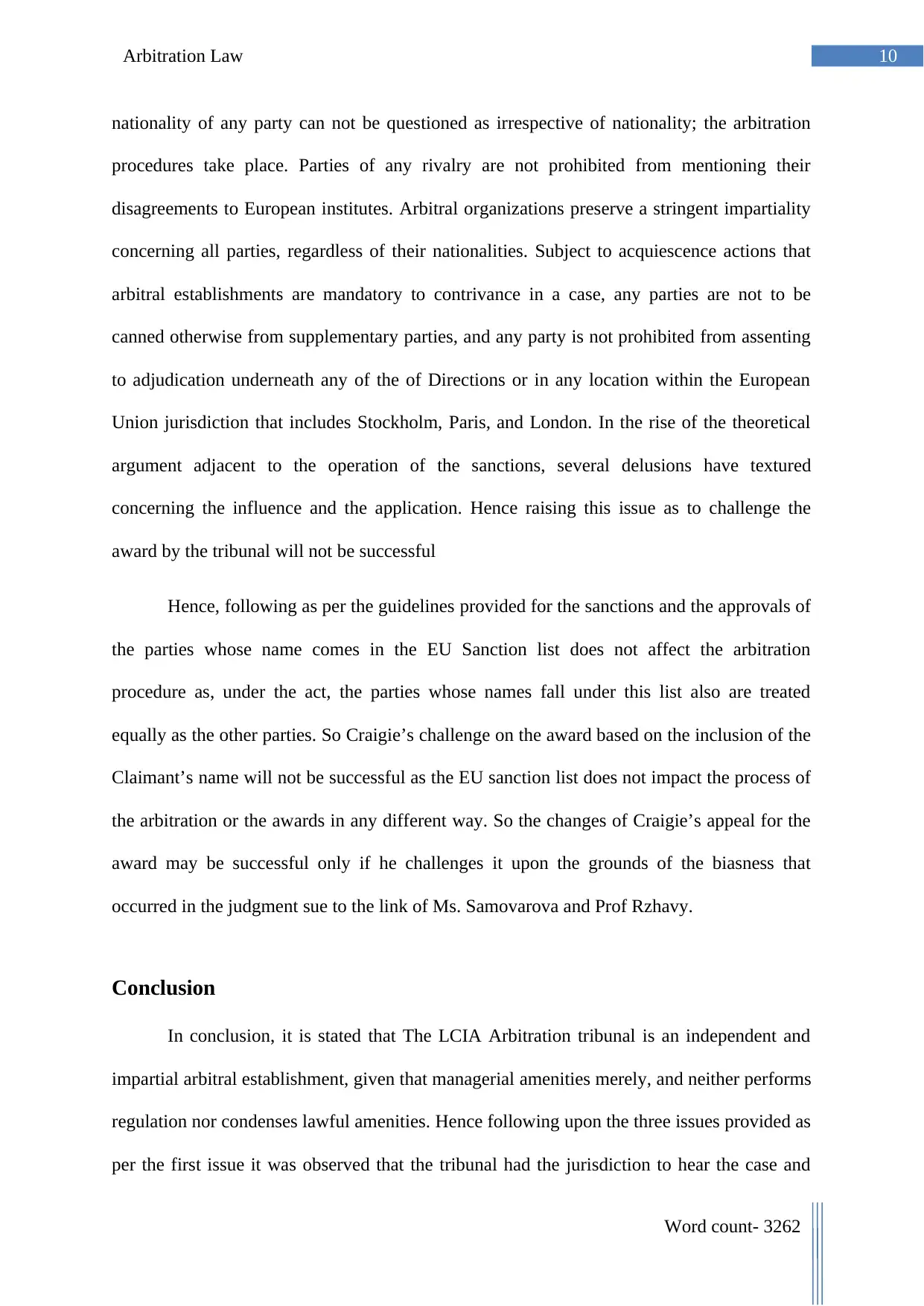
10Arbitration Law
Word count- 3262
nationality of any party can not be questioned as irrespective of nationality; the arbitration
procedures take place. Parties of any rivalry are not prohibited from mentioning their
disagreements to European institutes. Arbitral organizations preserve a stringent impartiality
concerning all parties, regardless of their nationalities. Subject to acquiescence actions that
arbitral establishments are mandatory to contrivance in a case, any parties are not to be
canned otherwise from supplementary parties, and any party is not prohibited from assenting
to adjudication underneath any of the of Directions or in any location within the European
Union jurisdiction that includes Stockholm, Paris, and London. In the rise of the theoretical
argument adjacent to the operation of the sanctions, several delusions have textured
concerning the influence and the application. Hence raising this issue as to challenge the
award by the tribunal will not be successful
Hence, following as per the guidelines provided for the sanctions and the approvals of
the parties whose name comes in the EU Sanction list does not affect the arbitration
procedure as, under the act, the parties whose names fall under this list also are treated
equally as the other parties. So Craigie’s challenge on the award based on the inclusion of the
Claimant’s name will not be successful as the EU sanction list does not impact the process of
the arbitration or the awards in any different way. So the changes of Craigie’s appeal for the
award may be successful only if he challenges it upon the grounds of the biasness that
occurred in the judgment sue to the link of Ms. Samovarova and Prof Rzhavy.
Conclusion
In conclusion, it is stated that The LCIA Arbitration tribunal is an independent and
impartial arbitral establishment, given that managerial amenities merely, and neither performs
regulation nor condenses lawful amenities. Hence following upon the three issues provided as
per the first issue it was observed that the tribunal had the jurisdiction to hear the case and
Word count- 3262
nationality of any party can not be questioned as irrespective of nationality; the arbitration
procedures take place. Parties of any rivalry are not prohibited from mentioning their
disagreements to European institutes. Arbitral organizations preserve a stringent impartiality
concerning all parties, regardless of their nationalities. Subject to acquiescence actions that
arbitral establishments are mandatory to contrivance in a case, any parties are not to be
canned otherwise from supplementary parties, and any party is not prohibited from assenting
to adjudication underneath any of the of Directions or in any location within the European
Union jurisdiction that includes Stockholm, Paris, and London. In the rise of the theoretical
argument adjacent to the operation of the sanctions, several delusions have textured
concerning the influence and the application. Hence raising this issue as to challenge the
award by the tribunal will not be successful
Hence, following as per the guidelines provided for the sanctions and the approvals of
the parties whose name comes in the EU Sanction list does not affect the arbitration
procedure as, under the act, the parties whose names fall under this list also are treated
equally as the other parties. So Craigie’s challenge on the award based on the inclusion of the
Claimant’s name will not be successful as the EU sanction list does not impact the process of
the arbitration or the awards in any different way. So the changes of Craigie’s appeal for the
award may be successful only if he challenges it upon the grounds of the biasness that
occurred in the judgment sue to the link of Ms. Samovarova and Prof Rzhavy.
Conclusion
In conclusion, it is stated that The LCIA Arbitration tribunal is an independent and
impartial arbitral establishment, given that managerial amenities merely, and neither performs
regulation nor condenses lawful amenities. Hence following upon the three issues provided as
per the first issue it was observed that the tribunal had the jurisdiction to hear the case and
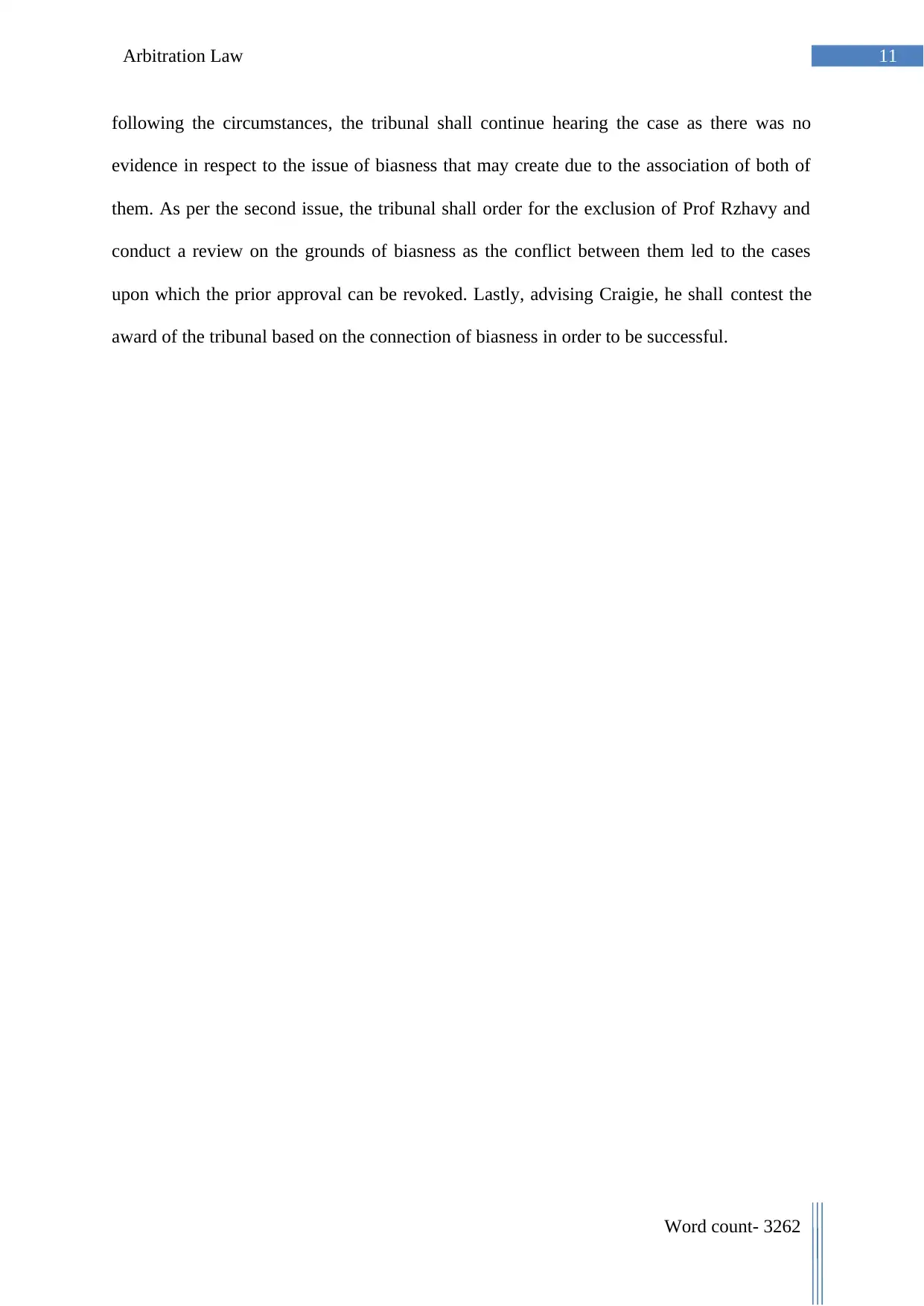
11Arbitration Law
Word count- 3262
following the circumstances, the tribunal shall continue hearing the case as there was no
evidence in respect to the issue of biasness that may create due to the association of both of
them. As per the second issue, the tribunal shall order for the exclusion of Prof Rzhavy and
conduct a review on the grounds of biasness as the conflict between them led to the cases
upon which the prior approval can be revoked. Lastly, advising Craigie, he shall contest the
award of the tribunal based on the connection of biasness in order to be successful.
Word count- 3262
following the circumstances, the tribunal shall continue hearing the case as there was no
evidence in respect to the issue of biasness that may create due to the association of both of
them. As per the second issue, the tribunal shall order for the exclusion of Prof Rzhavy and
conduct a review on the grounds of biasness as the conflict between them led to the cases
upon which the prior approval can be revoked. Lastly, advising Craigie, he shall contest the
award of the tribunal based on the connection of biasness in order to be successful.
⊘ This is a preview!⊘
Do you want full access?
Subscribe today to unlock all pages.

Trusted by 1+ million students worldwide
1 out of 14
Related Documents
Your All-in-One AI-Powered Toolkit for Academic Success.
+13062052269
info@desklib.com
Available 24*7 on WhatsApp / Email
![[object Object]](/_next/static/media/star-bottom.7253800d.svg)
Unlock your academic potential
Copyright © 2020–2026 A2Z Services. All Rights Reserved. Developed and managed by ZUCOL.




